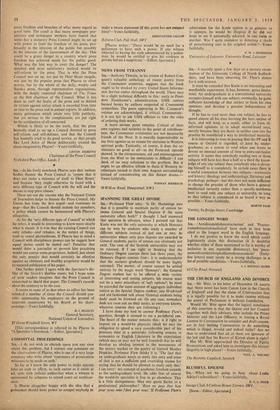S1R,—In his lively notebook Pharos says that various bodies finance
the Press Council to 'ensure that it does not make a nuisance of itself to Fleet Street,' and because 'they might otherwise be faced with a very different type of Council with the will and the means to stop press abuses.'
These are not the reasons why the National Union of Journalists helps to finance the Press Council. My Union has from the first urged—and continues to urge—that the Council should include lay members, a policy which cannot be harmonised with Pharos's allegation.
As for the 'very different type of Council' to which he refers, it would be interesting to know more clearly what is meant. It is true that the existing Council can only rebuke—and rebukes, in the nature of things, tend to sound platitudinous. If Pharos has in mind a Council with disciplinary powers can he suggest how equal justice could be meted out? Penalties that would deter a journalist or prevent him practising would not coerce some proprietors. Indeed, just about the only penalty that would certainly be effective against an obstinate and wealthy proprietor would be to suspend publication of his paper.
One further point. I agree with the Spectator's dis- like of the Sketch's dustbin stunts, but I hope none of your readers imagines that the Press Council is concerned to shield that paper. The Council's records show the contrary to be the case.
It seems to some of us that when an editor has been rebuked a number of times the Council should con- sider summoning his employers on the ground of apparent connivance by his Board at his short- comings.—Yours faithfully,
H. J. BRADLEY
General Secretary, National Union of Journalists 22 Great Windmill Street, WI
[This correspondence is referred to by Pharos in 'A Spectator's Notebook.'—Editor, Spectator.]










































 Previous page
Previous page